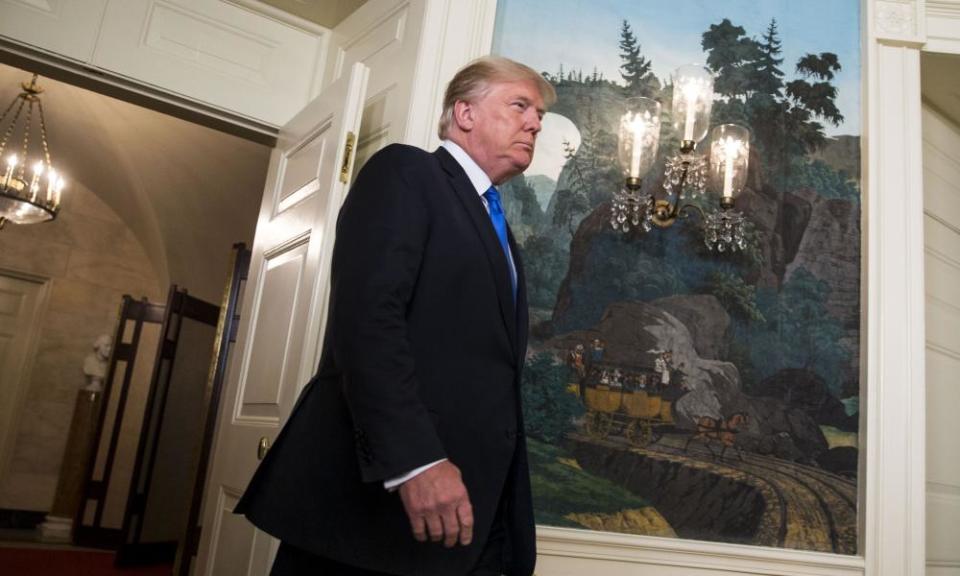Trump risks making US rogue actor as he condemns Iran nuclear deal
If the US imposes new restrictions on Tehran, Washington will find itself isolated – and without leverage to limit Iran’s nuclear programme, experts say

The content, tone and style of Donald Trump’s speech about Iran on Friday was a reminder of how much the current president of the United States relishes conflict.
With his domestic legislative agenda stalled and a federal investigation scrutinising his finances and his relations with Moscow, Trump has taken to finding enemies to rail against, including the press and black football players who kneel during the national anthem.
The tactic galvanises his core supporters and seems to rejuvenate him. He appeared similarly energised excoriating Iran on Friday. But taken into foreign policy, Trump’s visceral drive for confrontation threatens to add a second nuclear crisis to the one Trump has already escalated in the Pacific with North Korea.
The 2015 nuclear agreement with Iran, the Joint Comprehensive Programme of Action (JCPOA), was aimed at ensuring that nearly 40-year feud between the US and revolutionary Iran did not mutate into a confrontation between two nuclear states.
In return for sanctions relief from six major powers and the international community as a whole, Iran accepted very deep constraints on its nuclear programme. Its current stockpile of enriched uranium, for example, is just over 1% of what it was before the deal.
But in his speech, Trump completely ignored the non-proliferation gains represented by the JCPOA, and portrayed the repatriation of Iran’s previously frozen assets as money for nothing. He made the false claim that Iran had been on the point of “total collapse” when the agreement was signed.
His claims that “the Iranian regime has committed multiple violations of the agreement” were also misleading at best. On two occasions, Iran’s stockpile of heavy water flowed over the ceiling imposed by the deal, but the situation was quickly rectified and Iran’s reserve is now below the limit.
Nor is heavy water a direct proliferation threat. It is used in certain reactors that produce plutonium as a by-product. However, under the deal, Iran has destroyed the only reactor of that type.
Trump’s remark that Iran had “failed to meet our expectations in its operation of advanced centrifuges” appeared to refer to an ambiguity in the deal that has since been resolved and was not declared to be a violation.
Trump’s litany of Iran’s past alleged crimes was also highly contentious, including an effort to link Shia Iran with the Sunni militants of al-Qaida, and in particular Osama bin Laden’s 1998 attacks on US embassies in east Africa.
The state department did not comply with White House pressure to designate Iran’s Islamic Revolutionary Guard Corps (IRGC) as a terrorist organisation, but the Treasury did make that designation – under a relatively obscure clause – marking the first time a major part of a country’s armed forces has been described as terrorist. It was – to say the least – a risky move given that troops from both countries are in close proximity in Syria and potentially elsewhere in the region.
Trump’s speech also dimmed hopes that the nuclear deal could escape Trump’s hostility if he passed the decision over its fate to Congress. Congress is deeply divided over the issue and therefore might end up doing nothing, European diplomats had reasoned.
But after Trump’s remarks, that escape ramp appears to be blocked. Trump has called on Congress to add conditions to those Iran already complies with under the JCPOA, restricting ballistic missile development and extending restrictions on its nuclear programme indefinitely.
Even if a deeply divided Congress agreed on such changes – which would require the support of 60 senators – there is no realistic possibility Iran would accept them.
In that case, Tehran would be bound to cast the US as the rogue actor on the world stage – and Washington’s European actors would find it hard to disagree.
“Iran is not going to comply with provisions imposed unilaterally by the US. If the US then imposes sanctions or scraps the deal, then the US will be left highly isolated,” said James Acton, co-director of the Nuclear Policy Program and a senior fellow at the Carnegie Endowment for International Peace.
“The US will be blamed across the world for the collapse of the Iran deal, other countries will not cooperate with the US in reimposing sanctions on Iran, and the end effect will be that Iran’s nuclear programme will be unconstrained and the US will have no leverage to try to constrain it.”
However, if Congress does not agree on new conditions, Trump threatened to “terminate” the deal himself, by executive order. If he sticks to his word, the JCPOA appears doomed in its current form.
The other signatories could try to keep it going but major European companies are likely to flee Iran for fear of losing US markets. The benefits for Iran would shrink significantly, as would incentives to abide by its strictures.
A change of mind is always possible. Trump on Friday said he was “always open” to negotiation with North Korea after weeks insistenting that he had no intention of talking to the regime. Yet his animus towards Tehran, stoked by Israel, Saudi Arabia and the United Arab Emirates seems, if anything, even more deeply entrenched.

